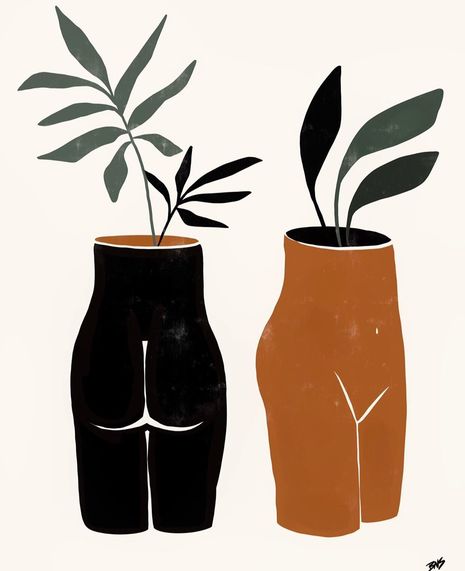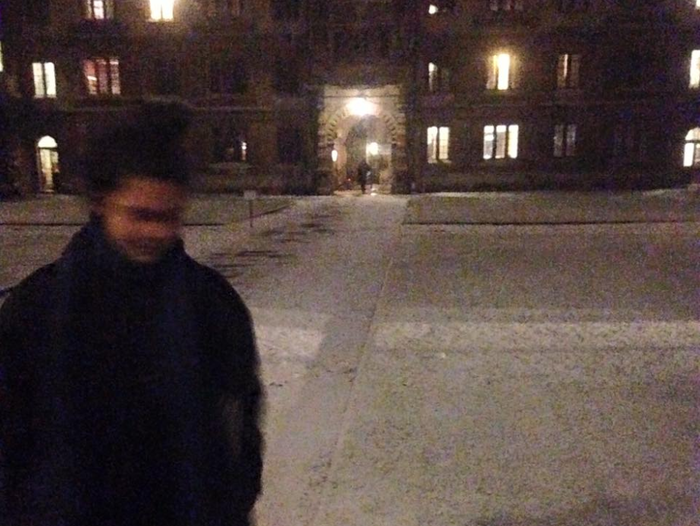Press Pause.
“Self-care is about survival, and music is my lifeline.” In her third Features column, Chiedza Matsvai reflects on the political roots and ongoing importance of self-care.

“Caring for myself is not self-indulgence, it is self-preservation, and that is an act of political warfare.” — Audre Lorde
For ten seconds, the sounds of dancehall and reggae-pop coalesce: high-pitched synth sounds ping between the strumming bass as momentum builds under the slightly vibrating snare. On the eleventh second, with my knees somewhat bent, my hands grasp the lateral part of each thigh. I brace my body to bounce in a gyrating, rhythmic motion at the beckoning of Rihanna's "work, work, work, work, work, work."
The concept of self-care was built upon by Black radical feminist Audre Lorde in her 1988 book, A Burst of Light: and Other Essays. Lorde declares, "Caring for myself is not self-indulgence, it is self-preservation, and that is an act of political warfare." For Lorde, self-care is a sustainable and defiant practice. But #selfcare on Instagram presents a diluted version of the concept, revealing that the unsustainable and aestheticised version of #selfcare marketed to us is limited to the physiological. Curated pictures of face masks, promotions of costly skincare regimens, and heads wrapped neatly in towels inundate my feed.
Reclaiming my humanity is an act of political warfare as I exist in a system that resists the idiosyncrasies of human experience.
In my reclamation of the radical roots of self-care, I realise that occasionally standing in the mirror twerking to Rihanna is not shirking reality. Instead, it's part of a more significant ritual - a self-care routine beyond the outward and material, and an opportunity to press pause. Music is its own perennial body - pulsating through its veins is an infinite source of life and comfort. Researchers have found that listening to music can increase dopamine levels, the 'feel-good' hormone. By conjuring a strong emotional and physical response, music for self-care helps me to process grief and suffering in a way that my mind cannot do unassisted.
In her 1968 interview with Down Beat Magazine, Nina Simone stated, "Music is one of the ways by which you can know everything which is going on in the world." Music is also a way by which I can know myself. Reclaiming my humanity is an act of political warfare as I exist in a system that resists the idiosyncrasies of human experience. Discourse in the news and on social media over the past fortnight has reminded me of the ways I am reduced to my ability, age, race, gender and sexuality by society. Self-care enables me to recognise that I am all of those things, yet none of those things alone.
In showcasing the full spectrum of human emotion, listening to Nina Simone's 1968 song, 'Ain't Got No, I Got Life,' reminds me of my humanity. Initially, the lyrics swirl from Simone's lips in a soothing, yet hoarse, manner as she veers into nihilism. Simone mourns the possessions, conditions (love, faith culture) and interpersonal relationship she lacks. But when she belts, "What have I got, nobody can take away?" she boldly reassures us that the body, and therefore life, is a cause for celebration:
I got my hair, got my head
Got my brains, got my ears
Got my eyes, got my nose
Got my mouth, I got myself
I got my arms, got my hands
Got my fingers, got my legs
Got my feet, got my toes
Got my liver, got my blood
I've got life, I've got life.
In Don't Touch My Hair, Emma Dabiri reminds us of the limitations of the 24-hour clock as it's "a distribution of time that serves the objectives of colonial exploitation and capital extraction." As an act of political warfare, self-care allows me to reject a system that demands that I serve it - to, instead, make room for myself. Whether I'm revising, running errands, or on the bus, music creates a place and space to centre my emotions. In the words of Maxine Waters, it's "reclaiming my time."
The mainstream perception of the (in Akala's words) "weed-smoking hippy" and one-love-guy thwarted Bob Marley's radical image. Nonetheless, his music offers political polemics - serving indictments on the legacies of colonialism and slavery. The 1974 song 'No Woman, No Cry' provides respite. In Marley's reminder, "In this great future, you can't forget your past," is an invitation to utilise his music as an archive through which I can find refuge within the fights for liberation. In speaking directly to me, regardless of time and place, Marley's music defies, and therefore reclaims, the boundaries of time and place. He also recalls the body, like Simone, when he affirms, "My feet is my only carriage." This image is a reminder that self-care is about allowing my body to recuperate, so that, in both the physical and immaterial sense of strength and courage, I can "push on through."
Self-care allows me to reject a system that demands that I serve it - to, instead, make room for myself.
Self-care isn't about the individual taking precedence over the whole. 'Self-preservation' allows the individual to serve the whole, sustainably. Many civil rights activists embraced Faith. On April 3rd 1968, in his last speech delivered at Mason Temple, Martin Luther King Jr. preached, "I just want to do God's will." Gospel music provided a 'sound-track' movement. The "Queen of Gospel,” Mahalia Jackson's 1958 song 'Lord, Don't Move the Mountain' is a prayer to God to strengthen the singer to overcome the trials of life. In being "the food of the soul," Gospel music supplies the willpower to withstand life's tribulations and regain the strength I need to continue to fight.
So, press play and, in the words of Corinne Bailey Rae, "Just go ahead, let your hair down." These are trying and traumatising times. In practice, music for self-care is an opportunity for introspection, as Nina Simone avers: "Anything human can be felt through music." I am a person, a multifaceted, three-dimensional being - not just some body floundering through oppressive frameworks. But I am also a people - to show up for others, I have to show up for myself. From twerking to Rihanna to 'Amen'-ing to Gospel - music is a corporal, spiritual and political self-care experience which transcends and transforms the physical. Self-care is about survival, and music is my lifeline.
 News / Caius mourns its tree-mendous loss23 December 2025
News / Caius mourns its tree-mendous loss23 December 2025 News / Cambridge welcomes UK rejoining the Erasmus scheme20 December 2025
News / Cambridge welcomes UK rejoining the Erasmus scheme20 December 2025 News / CUP announces funding scheme for under-represented academics19 December 2025
News / CUP announces funding scheme for under-represented academics19 December 2025 News / King appoints Peterhouse chaplain to Westminster Abbey22 December 2025
News / King appoints Peterhouse chaplain to Westminster Abbey22 December 2025 Interviews / Politics, your own way: Tilly Middlehurst on speaking out21 December 2025
Interviews / Politics, your own way: Tilly Middlehurst on speaking out21 December 2025








